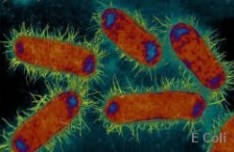
Vaccsbook

Infectious Diseases . . . and How to Avoid Them
E Coli

This information is for entertainment purposes only. It has not been verified by a third party. Last updated: a while ago.
Type of Disease
E. Coli can cause infectious disease depending on the strain. Most strains are found in the bowel and do not cause disease when confined there.
However, the Enterohemorrhagic E. coli (EHEC) strain can contaminate water and food
(commonly vegetables and uncooked hamburger) causing Gastroenteritis,
which in rare cases can progress to Hemolytic-Uremic Syndrome
(anemia, kidney failure, and bleeding disorders, which in a small percentage of patients is fatal).
O157:H7 is a common EHEC strain.
The Uropathogenic E. coli (UPEC) strain, normally found in the bowel,
can cause urinary tract infections (bladder and occasionally kidney).
The Enterotoxigenic E. coli (ETEC) strain causes "travellers diarrhea".
Type of Microbe
E Coli is a
bacterium.
It is described as:
a) Gram-negative (retains a red colour when seen with a microscope),
b) a Facultative Anearobe (usually "breathes" oxygen, but can survive without it),
c) rod-shaped (as opposed to round shaped when seen with a microscope),
Also known as
Escherichia Coli, and belongs to a group of bacteria with similar characteristics known as Coliforms. 80% of cases of Travellers Diarrhea are caused by a strain of E.Coli.
Vaccination
An oral vaccine is available against the ETEC (travellers diarrhea) form.
However it is only effective for 3 months so needs to be taken before any likely exposure.
Acquisition and Transmission
Gastroentritis is acquired by ingesting contaminated food or water, or by the "fecal-oral" route,
i.e. coming into contact with the feces of an infected patient and not washing hands before food preparation and eating.
Urinary infections are acquired by spread of small amounts of bacteria from the anus to the urethra, and thence into the bladder.
Signs and Symptoms
Gastroenteritis causes vomiting, diarrhea, abdominal cramps, and sometimes an elevated temperature.
The EHEC strain often causes the diarrhea to be bloody.
Urinary tract infections cause burning, and frequent urination (these infections are uncommon in males).
If left untreated, the bacteria can spread to the kidneys (pyelonephritis)
causing back pain and tenderness, and then to the bloodstream causing sepsis (blood poisoning).
Timeline
Incubation for gastroenteritis, the time between ingestion and symptoms, is 3 to 4 days (range 1 to 10).
Urinary tract symptoms may occur within a few hours of E.Coli entering the bladder.
Contagion
A patient with gastroenteritis can be contagious to others (via the fecal-oral route) while symptomatic with diarrhea.
Urinary tract infections cannot be passed from one patient to another.
Diagnosis
Diagnosis is usually made on the basis of symptoms, and can be confirmed by analyzing stool, urine, or blood samples. Complete blood count and kidney function test may reveal hemolytic-uremic syndrome.
Body Systems Affected
Gastroenteritis affects the intestines. Severe cases affect the blood and kidney systems.
Urinary tract infections affect the bladder; if severe the infection can spread to the kidneys and bloodstream.
Treatment
Treatment for patients with bowel symptoms is supportive, i.e. maintain hydration and nutrition.
Anti-bacterials effective against gram-negative bacteria can shorten the duration.
However, anti-diarrheal medications may prolong the illness.
Bladder infections can be helped by increasing fluid intake and therfore urinary output.
Anti-bacterials are usually given for bladder infections and definitely indicated for kidney/blood infections.
Prevention
Prevention of E.Coli gastroenteritis is through:
a) avoiding ingestion of contaminated food, e.g. prepared in locations with poor hygiene and safety standards,
b) avoiding ingestion of contaminated water, particularly free standing water or water from untreated wells.
The oral vaccine is often recommended for travel to countries with poor hygiene practices.
Prevention of E.Coli urinary tract infections is through:
a) maintaining oral hydration and voiding more frequently.
b) in females, maintaing good hygiene practices around the vagina and anus.
Complications
About 10% of gastroenteritis caused by EHEC strain can lead to the Hemolytic-Uremic Syndrome;
2% to 5% of these cases are fatal due to a combination of kidney failure, severe anemia, and spontaneous bleeding.
If urinary tract infections are left untreated, the bacteria can spread to the kidneys and cause pyelonephritis (kidney infection)
which can lead to kidney damage and rarely to kidney failure.
Fatalities
In otherwise healthy patients, Hemolytic-Uremic Syndrome is fatal in 2% to 5% of cases, but considerably higher in the elderly.
Epidemics & Pandemics
E.Coli does not occur in epidemics.
However, gastroenteritis can occur in localized outbreaks due to contaminated food or water, often confined to those eating at the same restaurant.
Occasionally outbreaks occur simultaneously in several locations due to widespread distribution of the same contaminated food source.
One noteable outbreak was in Walkerton, Ontario, Canada in the year 2000 when municipal well water became contaminated with O157:H7.
27 patients developed hemolytic-uremic syndrome from which 6 died.
Geography
E. Coli is found worldwide.